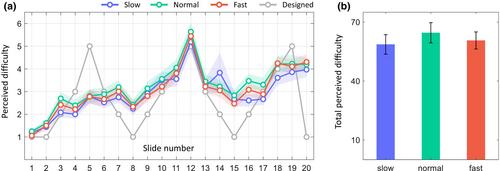Design and validation of an electroencephalogram-supported approach to tracking real-time cognitive load variations for adaptive video-based learning
Abstract
Cognitive load is a critical internal state associated with learners' learning process and significantly influences learning outcomes. With the worldwide popularity of video-based learning (VBL), tracking real-time cognitive load variations becomes more and more important for the timely provision of adaptive learning support during the learning process. This study proposed and validated an electroencephalogram (EEG)-supported approach to tracking real-time cognitive load variations during continuous VBL. We recruited 108 healthy adult participants to watch a specially designed video lecture with a sequence of interconnected slides of equal length. EEG signals were continuously recorded throughout the session. The video lecture was designed with varying levels of content difficulty (ie, rated from 1 to 5) across slides and was narrated at three different speeds (ie, slow, normal and fast) to induce cognitive load variations. For each slide, the cognitive load was quantified using both subjective ratings (ie, self-reported difficulty) and an EEG-derived measure (ie, alpha power). Through linear mixed model analysis, we demonstrated the feasibility of using alpha power to track real-time cognitive load variations during the continuous VBL process after controlling the effect of mental fatigue. This study provides a foundation for developing learning enhancement technologies that enable the timely provision of adaptive learning support in VBL.
Practitioner notes
What is already known about this topic
- Video-based learning has become a prevailing learning method for the current generation.
- Tracking the internal learning state of learners is essential for the timely provision of adaptive learning support during the video-based learning process.
- Cognitive load is a critical aspect of internal learning state.
- While EEG has been proven to be valuable in assessing average cognitive load of a task, few studies have investigated the feasibility of utilizing EEG to track real-time cognitive load variations in a task.
What this paper adds
- An EEG-supported approach was proposed to track real-time cognitive load variations in video-based learning.
- A high consistency was found between subjective ratings and EEG-derived measure of cognitive load.
- The presence of mental fatigue exerted a significant impact on EEG-derived measure of cognitive load.
Implications for practice and/or policy
- Generative AI can be leveraged to facilitate mass production of lectures required in the approach.
- Real-time tracking of cognitive load variations in video-based learning enables the timely provision of adaptive learning supports.
- Additional research is warranted to mitigate the effect of mental fatigue on real-time tracking of cognitive load variations.




 求助内容:
求助内容: 应助结果提醒方式:
应助结果提醒方式:


